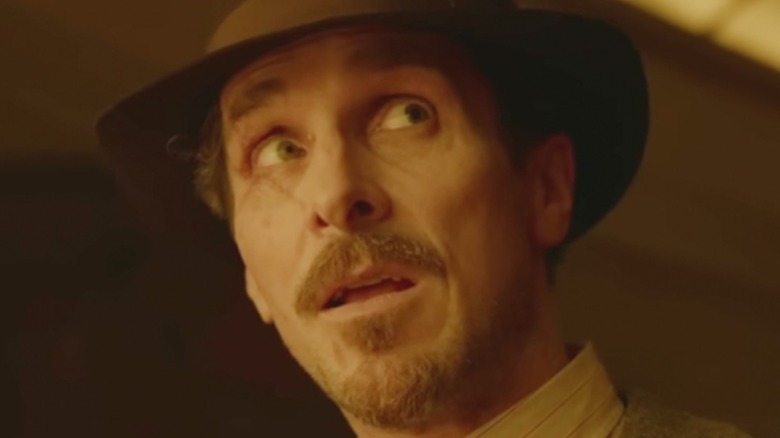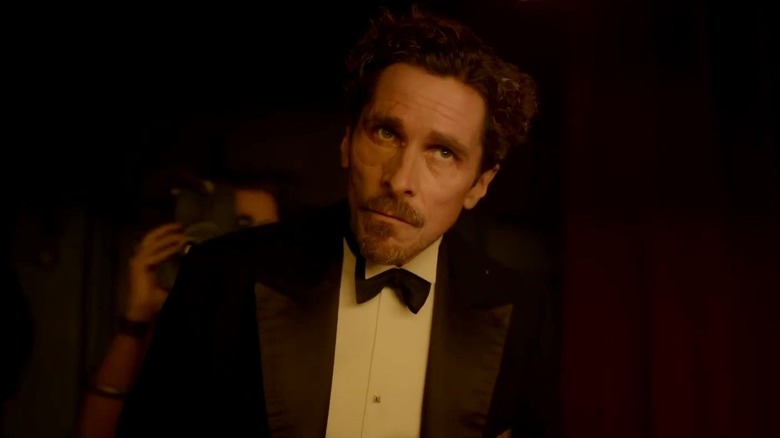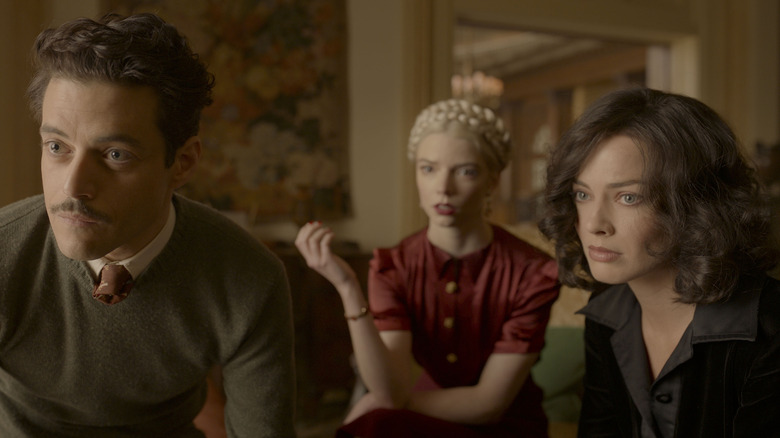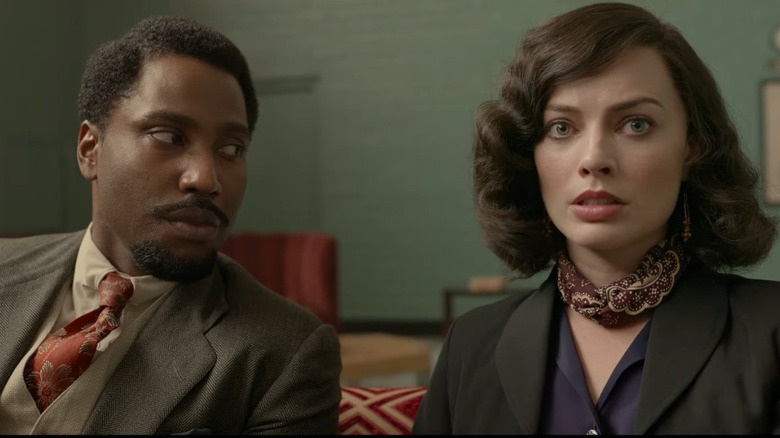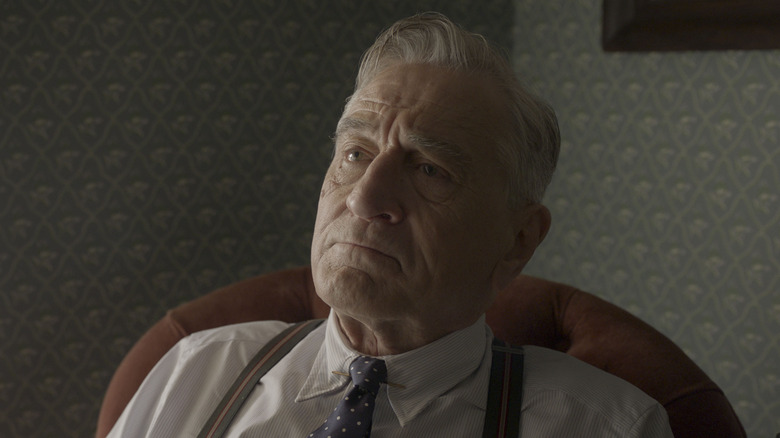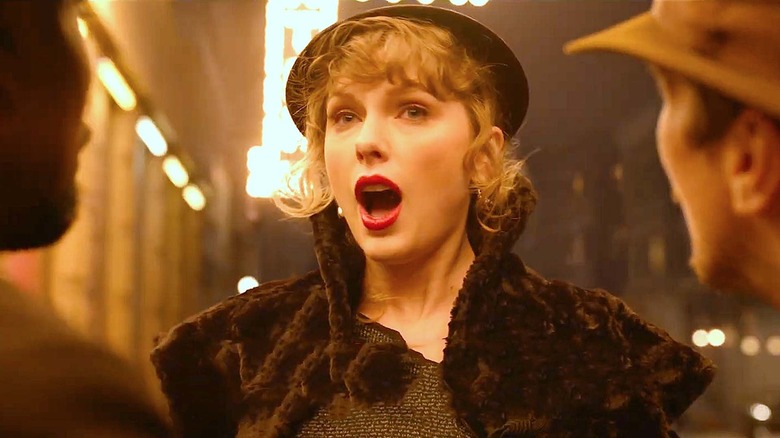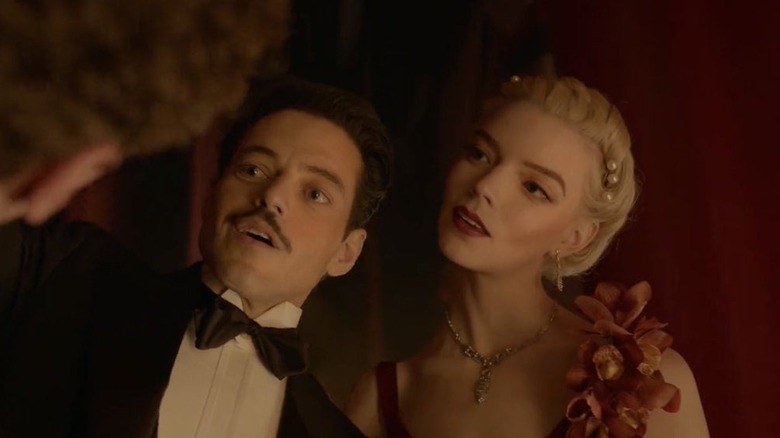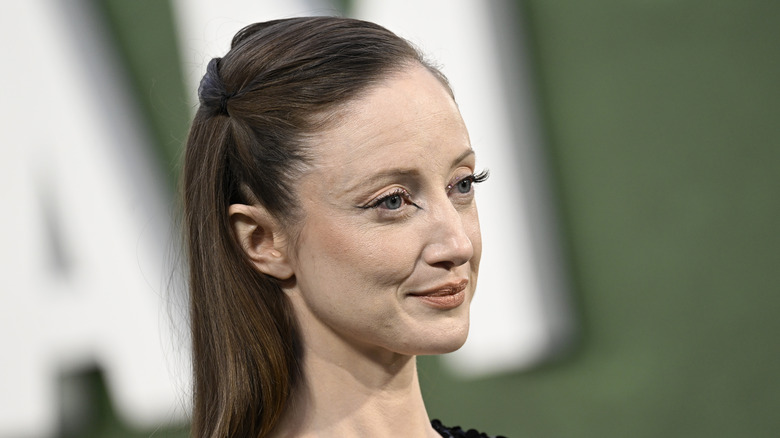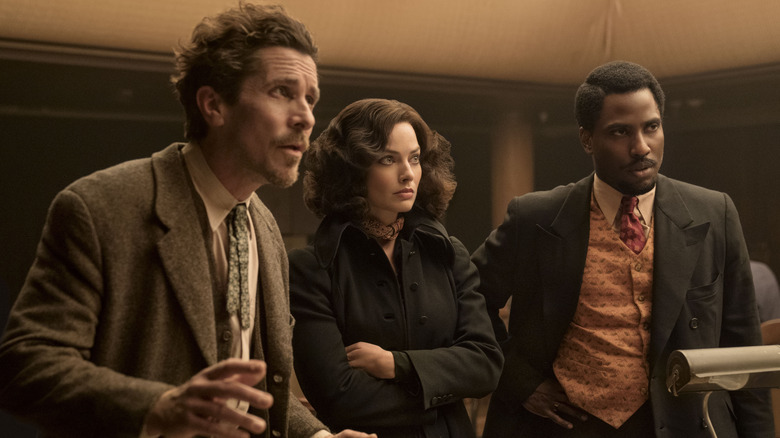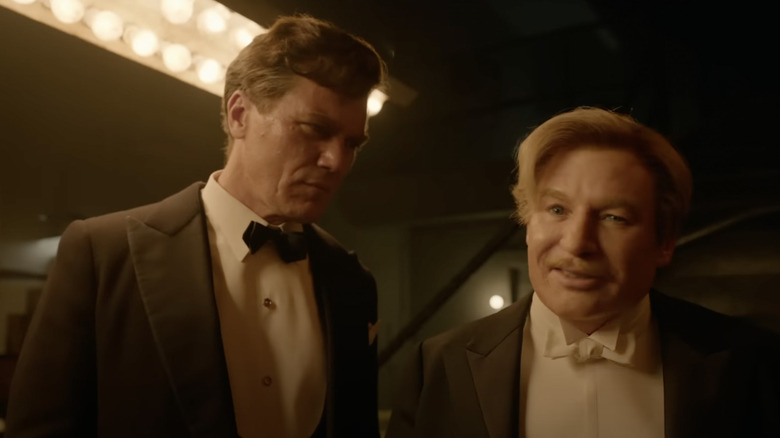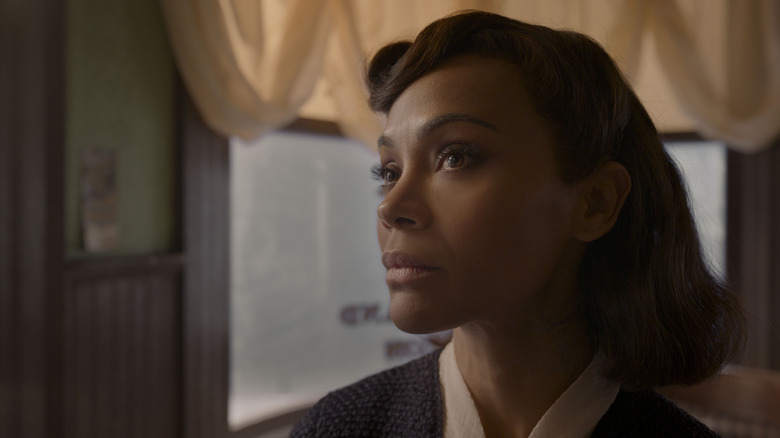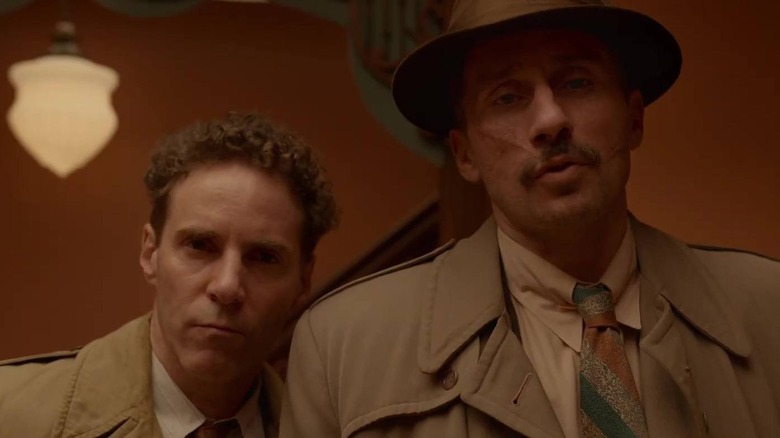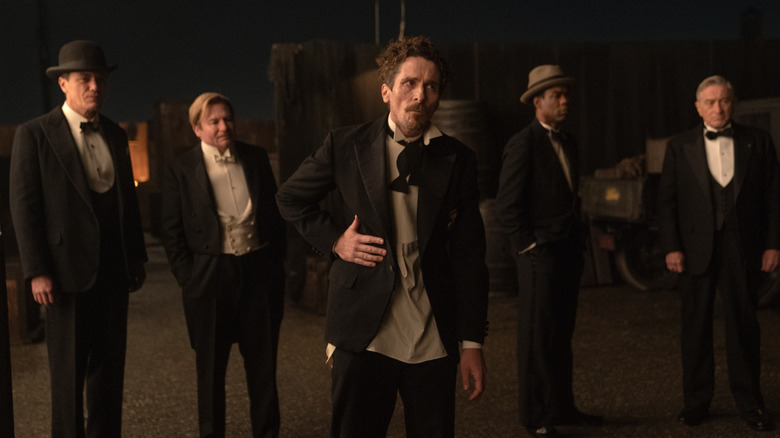The Ending Of Amsterdam Explained
"Amsterdam" is the latest film by Academy Award-nominated writer-director David O. Russell. Known for his work in dramas like "The Fighter" and "Silver Linings Playbook," "Amsterdam" is a tonal departure for the director, embodying elements of both ensemble dramas and screwball comedies. Led by an all-star cast of A-listers including Christian Bale, Margot Robbie, John David Washington, Zoe Saldana, and Robert De Niro, the film promises viewers high-stakes political intrigue, a whodunnit murder mystery, and most of all, a story about friendship.
"Amsterdam" follows a trio of friends, played by Bale, Robbie, and Washington, who meet during World War I in an infirmary in Amsterdam. Years later, two of them are framed for a murder and, in an attempt to prove their innocence, happen upon a government conspiracy that threatens democracy. If that all seems like a lot for a single movie, most critics would agree with you (just see The Hollywood Reporter), but it's certainly a great vehicle for a cast this stacked and talented all at once.
Given the film's inherently convoluted and twisty nature (per Variety), many audience members may walk out of theaters perplexed by the sequence of events in the film. Some directorial decisions can make the film's closing moments feel like mixed messages, while other character arcs may not be adequately explained to every moviegoer. However, nothing is a coincidence in this film, as the lead trio quickly discovers.
Why Burt chooses love in the end
Christian Bale takes center stage in "Amsterdam," reuniting with Russell after roles in films like "The Fighter" and "American Hustle." In "Amsterdam," Bale plays Burt Berendsen, a doctor who lost his eye in World War I. After spending time in the titular city with his friends Harold and Valerie, Burt returns to New York City. There, he starts up a medical practice treating other wounded veterans, and attempts to romance Beatrice (Andrea Riseborough), whose family doesn't accept him due to his unorthodox treatments.
Eventually, Burt and Harold's framing for the murder of a prominent U.S. Senator's daughter collides with Burt's search for love. Harold tries to push Burt to pursue a flirtation with mortician Irma (Zoe Saldana), but Burt is opposed due to his prior commitment to Beatrice. By the end of film, however, it's love that exonerates Burt and Harold, not hatred, which convinces Burt that he needs to focus on where he's been putting his love, and whether or not people like Beatrice are worth his time.
When Harold and Valerie offer Burt a chance to come with them back to Europe, where they can resume their escapades like the ones they had in Amsterdam, Burt rejects. Though he briefly considers running on board the ship with them in a fantasy, Burt ends up staying behind, determined to pursue love like Harold wanted him to earlier in the film. Perhaps his romance with Irma is just beginning.
Valerie's family secret explained
Margot Robbie's character, Valerie, is enigmatic when audiences are first introduced to her. As a nurse during World War I, she is responsible for healing Burt and Harold of their wounds. The three later strike up a friendship, and romance blossoms between Valerie and Harold. However, as Burt and Harold plan to return to America, Valerie vanishes. Given that they know nothing of her past, it seems like their relationship will be lost to time.
That is, until they run into her during their attempt to meet with Mr. Voze, a prominent philanthropist who lives in New Jersey. As they're being turned away by Libby Voze (Anya Taylor-Joy), Valerie appears from another room, stunning Burt and Harold. They quickly discover that Mr. Voze is Valerie's brother, and she's being treated for a developing nervous disorder and vertigo, which is quite unlike the Valerie they knew in Amsterdam. Though they struggle to trust her right away, they eventually rely on a pact they all made to protect each other in Amsterdam.
As it turns out, Valerie's nervous disorder is a result of poisoning by Mr. Voze. The unruly, artsy Valerie is kept a prisoner of Voze and Libby while they enact a secret plan to install a fascist dictator in the U.S. government. Valerie, discovering this, appears to shoot the two in the face near the end of the film, but this turns out to be another fantasy. At least she didn't turn out to be a secret Nazi.
Harold's future with Valerie in Europe
During their time in Amsterdam, Harold (John David Washington) starts a romance with Margot Robbie's Valerie. Even after Burt returns to America to resume his medical practice, Harold stays in Europe with Valerie until he must return to bail Burt out of prison. Valerie subsequently disappears rather than return to America with Harold, knowing that their relationship could never work in 1930s America.
This only drives a further wedge between them years later, when Harold discovers that Valerie has been living in New Jersey ever since, having never received a call or letter from her. Nevertheless, their attempt to expose a government conspiracy brings them closer together, even teaming up to thwart an assassination attempt against General Dillenbeck (Robert De Niro). By the time their relationship is criticized by her white supremacist brother and sister-in-law, she's more confident in her love for him.
However, even after they succeed in taking down a Nazi faction in the U.S. government, 1930s America is still far from a utopia. Harold and Valerie board a ship to return to Europe. While they initially plan to go back to Amsterdam, the U.K. spy Paul Canterbury arranges for them to go somewhere safer, given the oncoming threat of the Gestapo and Hitler in Europe. For now, the star-crossed lovers get to resume their love affair, but for how long is unknown.
Dillenbeck risks his life for a speech
Robert De Niro makes his debut late into "Amsterdam," playing the esteemed U.S. General Gil Dillenbeck. In 1930s America, Dillenbeck (who is based on real-life Marine Corps General Smedley Butler, per The Guardian) is a minor celebrity, having made speeches and earned the favor of people like Libby Voze, who is a superfan of the general. However, Dillenbeck has a primary role to play in the takedown of the Committee of Five, when he's recruited to give a speech at a veterans' gala hosted by Burt and Harold.
Given that the previous speaker was meant to be Bill Meekins, the U.S. Senator and former general who was killed by the Committee of Five, accepting the job puts Dillenbeck's life on the line. He's offered a large sum of money to openly vouch for the Committee of Five, which will lead to the installation of a fascist dictator in the U.S. government. Though he seems willing to accept that money from the sinister Mr. Voze, he eventually speaks on the side of democracy, accusing the Committee of killing his friend Bill and having Nazi associations.
Unfortunately, the Committee of Five has a backup plan involving a mysterious supporter (Timothy Olyphant). Harold and Valerie thwart the assassin's attempt to shoot Dillenbeck on stage, though Burt is wounded in the process. Though De Niro's screen time in "Amsterdam" is short, it's certainly a meaty, prominent role for the frequent David O. Russell collaborator.
The tragedies of Liz Meekins and her father
When "Amsterdam" starts, audiences are quickly introduced to Elizabeth Meekins (Taylor Swift) when she hires Burt and Harold. As the daughter of prominent U.S. Senator Bill Meekins (a former friend of Burt and Harold from WWI), Liz trusts the two to perform an autopsy on her father, whose death she believes to be the result of foul play. Her suspicions are proven correct when Burt deduces that Bill was poisoned.
By the time Harold and Burt return to inform Liz, she's actively avoiding speaking to them. It becomes clear that someone has threatened her, and she's afraid to be seen with them out of fear she's being watched. Then, in perhaps the film's most memorable moment, she's pushed in front of a moving car by a stranger played by Timothy Olyphant. Burt and Harold witness Liz's sudden death in the span of a few seconds, and are subsequently blamed for her murder by the stranger and passing bystanders.
Exonerating themselves for Liz's sudden and disturbing murder becomes Burt and Harold's primary goal in the film. They soon discover the deeper reason for Bill and Liz's deaths being linked to a larger government conspiracy. It turns out that when Bill refused to support the Committee of Five, he was poisoned, and Liz's investigation made her another target of the Nazis. Fortunately, Burt, Harold, and Valerie get justice for these two tragic victims by exposing the Committee's plot.
Tom Voze's secret plan is exposed
Rami Malek makes his debut in a David O. Russell film with "Amterdam," playing the villain alongside Anya Taylor-Joy as a husband-and-wife pair of secret fascists. Malek's mysterious philanthropist Tom Voze becomes a key figure in establishing Burt and Harold's alibis, as his name was one of the last things Liz Meekins said before she was suddenly killed. When they arrive at Voze's estate in New Jersey to earn his support, Burt and Harold run into their old wartime friend Valerie, who is kept at home against her will by her rich, controlling brother and sister-in-law.
The big third act not-much-of-a-twist in "Amsterdam" reveals that the married couple are also secretly Nazi sympathizers, even going so far as decorating the walls of Voze's office with photos of Hitler and other members of the Nazi Party. In cahoots with the Committee of the Five, Voze offers Dillenbeck a large amount of money to support the fascist cause in his speech, which he refuses. Timothy Olyphant's mysterious red-faced murderer shows up to assassinate Dillenbeck, but he's thwarted and the plot is exposed.
Tom is later arrested for his involvement in the Committee of the Five, though he gets a moment to speak his detest for his sister Valerie's romance with Harold, a Black man. The two are pretty predictable as the evil masterminds behind the film's events, but at least they get the judgment they deserve for their crimes.
Beatrice takes advantage of Burt's love
Andrea Riseborough plays Beatrice, Burt's wife who happens to not like him very much. She and her father share this opinion, not feeling particularly bothered when Burt is sent off to World War I to die (though he manages to come back, albeit without one of his eyes). In the film's first half, Burt is still trying to earn Beatrice's reluctant affection, bringing her flowers moments after witnessing a murder for which he's been framed. Her father continues to reject Burt due to his unorthodox medical practices, which often involve pills that he becomes addicted to taking himself.
However, Burt surprisingly sees his luck change when Beatrice and her family attend his veterans' gala. With Dillenbeck as the main speaker and a who's who of World War I heroes in attendance, Burt finds himself introducing Beatrice and her parents to several important figures in the 1930s New York City social scene. This comes shortly after Beatrice catches Burt flirting with Zoe Saldana's Irma earlier in the film. Sooner or later, though, Burt catches on to the abuse of privilege from Beatrice.
After one too many instances of Beatrice taking advantage of Burt's kindness and love for her, he breaks up with her in the middle of the gala. Her shock and confusion isn't enough to lure Burt back in as he hugs his two best friends for comfort. Given Burt's sweetness throughout the film, he deserves more than the snooty woman rejecting him from the start.
The origin of the Committee of the Five
"Amsterdam" is very loosely based on real events that predate the Second World War (via Variety). Its real-life historical basis, known as the Business Plot, took place in the early 1930s with a malicious attempt to elect a U.S. General as the leader of a fascist veterans' organization and overthrow the United States government. However, the General in question, Smedley Butler, testified to the House of Representatives about the plot, which has remained the subject of historical questioning for years.
In the world of David O. Russell, things play out in a slightly different manner. There's still a general, though here it's Robert De Niro's Gil Dillenbeck. There's also a veterans' organization, with an annual gala hosted by Bale's Burt Berendsen. However, Russell reframes the conspiracy as the plot of a mysterious secret society known as the Committee of the Five, made up of several wealthy businessmen from America who have ties to Nazi Germany.
The Committee of the Five is obviously named for the Committee of Five (note the lack of "the" in the real organization), the group of officials who drafted the Declaration of Independence in 1776, including Thomas Jefferson, Benjamin Franklin, and John Adams (via History). It makes sense that this evil organization would choose a similar moniker, seeing as their dream for America would likely result in a revision of the country's original morals.
The identities of Canterbury and Norcross
Mike Myers is no stranger to spies and secret societies, per his previous works like the "Austin Powers" trilogy and his recent Netflix series "The Pentaverate." Here, he teams up with Michael Shannon to play a pair of spies from the U.K. and U.S. investigating the rise of fascism. They also have an unexplained connection to Margot Robbie's Valerie, who introduces the secret spies to Burt and Harold during the trio's time in Amsterdam.
Myers' character, Paul Canterbury, puts up a front of running a glass eye company, with Shannon playing Norcross, his colleague and fellow bird-watching enthusiast. The two are quite an odd couple when they show up, but it's not until they reappear during Burt and Harold's frantic alibi-proving that their true identities as government spies are revealed. There, they deliver some exposition about what the Committee of the Five is, and why they need the trio to convince General Dillenbeck to make a speech at the gala, hoping to lure Nazi sympathizers there.
Though their allegiances and bird-watching ethics are brought into question by the characters, it turns out there's nothing to fear with Canterbury and Norcross. They truly are spies trying to maintain democracy in the world, and even go far enough to help Harold and Valerie find refuge in Europe as World War II is about to begin. If any characters from "Amsterdam" deserve a spin-off, it's these two.
Irma's mystery attacker
Zoe Saldana's role in "Amsterdam" is very blink-and-you'll-miss-it, as she only appears a handful of times in the film as the coroner Irma St. Clair. In one of the film's early scenes, Irma assists Burt with performing an autopsy on Bill Meekins. During this sequence, Harold tries to coerce Burt to flirt with Irma, but Burt refuses due to his commitment to Beatrice. Once Burt and Harold end up framed for the murder of Meekins' daughter, they're reliant on Irma's autopsy report as their alibi for the cops.
Unfortunately, Irma is unable to give it to Burt after she's attacked by a mysterious assailant. She shows up at his office with a broken arm, which Burt helps mend, but she nevertheless tells the cops what was in the report: Bill Meekins was poisoned. Unfortunately for Zoe Saldana fans, this is about as much as she gets to do in the film, as the character later only appears briefly during the veterans' gala sequence.
One thing that's not fully explained, however, is who attacked Irma and stole the autopsy report. The report never shows up later, so one can assume it's someone trying to cover up for the Committee of the Five. We find out later that Timothy Olyphant's character has been stalking Harold and Valerie, who chase him to a sterilization clinic, so whoever attacked Irma is unseen to audiences, leaving that one mystery unsolved in the movie.
Detective Getwiller coaches Hiltz
After Burt and Harold are suddenly framed for the murder of Liz Meekins, they make a run for it and end up back at Burt's apartment. There, they're visited by New York City detectives named Getwiller and Hiltz, played by Matthias Schoenaerts and Alessandro Nivola, respectively. The detectives have come after eyewitnesses claim to have seen the two men push the Meekins woman in front of a moving car. Burt, knowing Getwiller as one of his veteran patients, promises they're innocent and that they can establish their alibis.
The detectives give Burt and Harold a few days to provide the necessary documents, or else they'll be brought in for questioning. However, obtaining some the autopsy report proves tricky. They eventually settle for Harold's contract with Liz Meekins, which they obtain at some point off-screen. This may make some audience members confused when Getwiller and Hiltz are suddenly on board for Burt, Harold, and Valerie's plan to lure Nazi sympathizers to the veterans' gala.
During an earlier part of the film, however, Hiltz seems to assume Harold's guilt due to his race. While this seems to set up a rivalry between the prejudiced detective and the respectable Harold, the setup never leads anywhere. However, it does establish the societal limitations Harold faces that ultimately result in his return to Europe with Valerie.
History doomed to repeat itself
The critical consensus seems to be that "Amsterdam" is a film with a lot to say but not enough space to say it. While at its heart it centers on three friends bound together by war, the presence of more characters than it needs and its need to deliver a politically-relevant message tend to make it feel overstuffed and thin on material. However, one theme that stands out from the film is history repeating itself. Many of the characters in this film take great strides in refusing to make the same mistakes they have before.
This ties into Burt's relationship with Beatrice as much as it does to Harold and Valerie growing apart. By the end, Burt has realized he deserves more love than he's gotten, while Harold and Valerie pledge to not let anything stand in the way of their love. Similarly, this theme also applies to the film's more political themes. With World War II incoming, history is fated to repeat itself, and these characters do their best to thwart the inevitable threat of fascism.
More than anything, though, "Amsterdam" is a film about loving what you have. Whether it's love for friends, family, partners, or country, love is the best way to fight hatred. It's too bad that David O. Russell's first film since "Joy" struggles to be cohesive enough for many viewers to walk away with that message.
